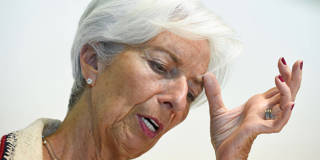Following her likely confirmation in November, Christine Lagarde will succeed European Central Bank President Mario Draghi at a time of deepening polarization among eurozone member states. It will take all of her skills as a leader and communicator to safeguard the institution's independence and ensure that it has the tools it needs.
BERLIN – As the nominee to succeed European Central Bank President Mario Draghi in November, Christine Lagarde may be hoping that her job will be somewhat easier than that of her predecessor. Yet the opposite is likely to be true. Though Draghi was tasked with guiding the ECB through years of crises, Lagarde will have to pursue eurozone reforms at a time of deepening polarization among member-state governments. It will take all of her skills as a political mediator, crisis manager, and effective communicator to safeguard the ECB’s independence and effectiveness.

BERLIN – As the nominee to succeed European Central Bank President Mario Draghi in November, Christine Lagarde may be hoping that her job will be somewhat easier than that of her predecessor. Yet the opposite is likely to be true. Though Draghi was tasked with guiding the ECB through years of crises, Lagarde will have to pursue eurozone reforms at a time of deepening polarization among member-state governments. It will take all of her skills as a political mediator, crisis manager, and effective communicator to safeguard the ECB’s independence and effectiveness.